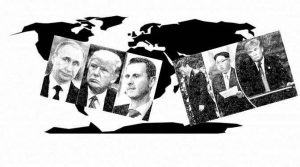April 2017
 After the legislative and popular failure of his forays into immigration and healthcare policy, the even more complex world of geopolitics has emerged as the favoured policy ground for Donald Trump. Surprisingly, the un-nuanced and instinctive approach that he brings to every issue has provided him with some initial wins, both in terms of popular approval and arguable strategic merit. The Middle East in general and Syria in particular is not a space in which any global power can hope to make lasting change by imposing a solution to any of the problematic schisms in the region. Indeed, it is beyond doubt that it was the hubris of Britain and France believing that they could create sovereign states that aligned with their own arbitrarily defined spheres of influence in 1916 that got the region into the disarray that it finds itself today.
After the legislative and popular failure of his forays into immigration and healthcare policy, the even more complex world of geopolitics has emerged as the favoured policy ground for Donald Trump. Surprisingly, the un-nuanced and instinctive approach that he brings to every issue has provided him with some initial wins, both in terms of popular approval and arguable strategic merit. The Middle East in general and Syria in particular is not a space in which any global power can hope to make lasting change by imposing a solution to any of the problematic schisms in the region. Indeed, it is beyond doubt that it was the hubris of Britain and France believing that they could create sovereign states that aligned with their own arbitrarily defined spheres of influence in 1916 that got the region into the disarray that it finds itself today.
Against that backdrop, it is reasonable to argue that all that the UN or NATO or any Western power can and should do at this point is monitor the emerging regional actors and make sure that the means used to establish and/or consolidate power in the region are not unconscionably harmful to civilian populations. By launching an attack to degrade Assad’s air capacity and dropping a powerful MOAB to similarly degrade the capacity of ISIS in Afghanistan, the Trump administration has arguably met that standard. By providing a wrist slap to both the Shia-backed Alawite regime in Syria and the Sunni-led ISIS forces in Afghanistan, the US has reminded both sides that they will not tolerate excesses. While it is ironic and unnerving to think of Donald Trump asserting himself as the adult in the room in the region, these moves, however conceived, have probably done just that, and would probably have been even more unreservedly saluted had they been an initiative of the previous administration.
So much for the good news. The downside to all of this is The Donald’s inclination to go back to revisit every successful scenario again and again, be it post-election campaign-style rallies or successive seasons of The Apprentice. There is more than a little reason to fear that he has decided that if it works in the Middle East, it has to work on the Korean peninsula. That is not to say that it can’t; a more aggressive tone with North Korea may be exactly what is required to push China into exercising greater control over its volatile client state. It is just hard to see Trump, or even the more seasoned heads in his administration, having the nuanced understanding of the geopolitical subtleties necessary to make this a constructive rather than destabilizing development. The balance of power that steadies Korea is one in which the US is already an active participant as the patron of the South. Its intercessions cannot be cautionary to both sides; they are already a partisan, and increased activity can only be a provocation.
In Syria, a successful return to influence in the region did not depend upon the prudence and wisdom of Putin’s Russia. The success of Trump’s Korean strategy will entirely hinge upon the ability of Chinese President Xi Jinping to be the adult in the room.

